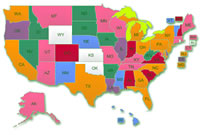To help you figure out your relationship to risk, we’ve created a short quiz. Take a few moments to complete it, choosing the answer that best describes you. The results should give you a good idea of how comfortable you are (or aren’t) with taking risks.
| 1. | My primary goal is to: |
| a. | Protect my savings. I’m most concerned about preserving what I have. |
| b. | I’d like to at least keep up with inflation. |
| c. | I’m willing to take some investment risk to get a good return. |
| 2. | If the stock market dropped 10 percent tomorrow, I would: |
| a. | Sell everything. I can’t afford to lose it all. |
| b. | Bide my time and see what happens. |
| c. | Put more money in-aren’t you supposed to “buy low, sell high”? |
| 3. | If I had a choice between $1,000 cash and a 1 in 10 chance for $10,000, I would: |
| a. | Take the money and run. |
| b. | It would depend on my current financial situation-if I desperately needed the money, I’d take the cash. |
| c. | I’d take a chance-sometimes you win, sometimes you lose. |
| 4. | Would you invest in a start-up company? |
| a. | Only if the founder was Bill Gates. |
| b. | Yes, if I had extra cash to spare and the company had a good business plan. |
| c. | Of course-I’m always looking for new opportunities. |
| 5. | Short-term losses in my retirement account make me feel |
| a. | Extremely worried-I just can’t sleep at night when I know that I’m losing money. |
| b. | A bit concerned-but I know that I have a long time ahead to make up the difference |
| c. | Committed to my investment plan. I know the market will go up over the long haul. |
| 6. | Do you like surprises? |
| a. | No, not even when I was a child. |
| b. | Only on my birthday.. |
| c. | Half the fun in life is seeing what happens next |
| 7. | When I make a bad investment, |
| a. | I brood about it for months, sometimes years afterwards. |
| b. | I try, sometimes successfully, to let it go. |
| c. | I focus on my next venture. |
| 8. |
In my daily life: |
| a. | I like predictability and routine. |
| b. | I try to do things differently every once in a while. |
| c. | I can’t stand to do the same thing twice. |
| 9. | I am like the: |
| a. | Chicken-afraid to venture out. |
| b. | Golden retriever-even-tempered and easygoing. |
| c. | Cheetah-fast, solitary, and carnivorous. |
| 10. | My outlook on the future is: |
| a. | Pessimistic-things always seem to get worse and worse. |
| b. | Half-empty and half-full-sometimes things work out, sometimes they don’t. |
| c. | Optimistic-things always end up for the best. |
_________ A’s
_________ B’s
_________ C’s
If you listed more A’s:
You are very risk-averse. You tend to seek out conservative investments with predictable returns. While it’s important to work with your natural style, it’s also good to stretch yourself a bit. Try some learned optimism-see the best in new situations, and take a risk once in a while!
If you listed more B’s:
You are a good balance between risk-averse and risk-seeking. You tend towards prudent investments that take on an acceptable amount of risk. Your challenge is to seek investments that suit your life stage and financial goals.
If you listed more C’s:
You are a risk-taker extraordinaire! You go for it-every time! Try to temper your risk-seeking tendencies toward wildcat investments with a sense of balance and realism. Be sure that you take care of the basics before you go for the risky stuff.
Choosing Your Investments
Each investment carries its own set of risks. Here is a chart that ranks investments in order of risk of loss from lowest to highest.
| Types of Investments | |
| Defensive investments | Savings accounts Money market accounts Treasury bills Short-term CDs and bonds |
| Conservative investments | Intermediate-term CDs and bonds GNMA funds (Ginnie-Maes) Fixed annuities |
| Moderate investments | Long-term bonds Stocks and equity mutual funds Variable annuities Low-leverage real estate |
| High risk investments | Junk bonds Options High-leverage real estate Precious metals Collectibles Penny stocks Venture capital Commodities futures |
Most of the investments shown in this chart can be purchased through mutual funds. The concept of mutual funds is fairly simple. A mutual fund is a pool of money from investors with goals similar to yours; this money is invested by the mutual fund manager or investment committee. You buy shares in the mutual fund, and then sit back and leave the rest to the experts, who invest your money in stocks or bonds of many different companies or government entities.









